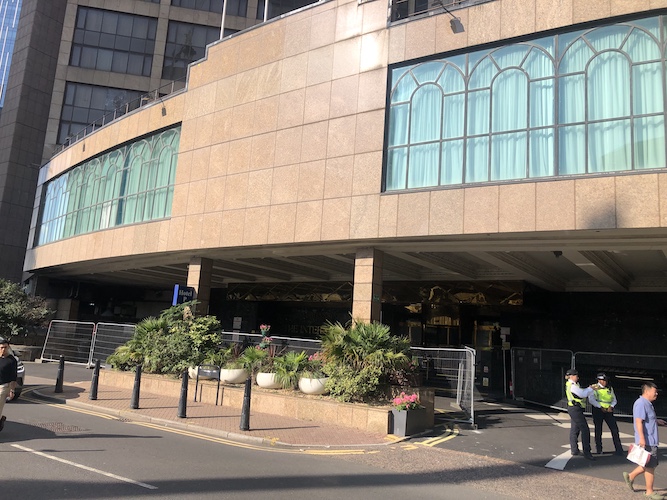At the time of writing, no London borough has formally announced plans to challenge asylum seekers being housed in hotels. And while there have been recent protests at hotels in Canary Wharf and Islington, protestors objecting to “asylum hotels” in the capital have often been outnumbered by counter-protestors.
This might seem typical of a city characterised by diversity, one which has welcomed people fleeing persecution through the ages – from Huguenots, to Jews, to Ugandan Asians, to Vietnamese “boat people”. London is already doing its bit, and more besides, in accommodating asylum seekers. But any shift in national policy in response to this week’s Epping court ruling could have big impacts.
According to a Migration Observatory briefing issued last week, the number of asylum seekers in London grew more than fourfold between 2018 and 2024. Its share of the UK total rose from nine to 19 per cent, part of a broader shift to southern England from the rest of the UK. Any connection to the distribution of marginal seats may be coincidental.
Use of hotels and other short-term “contingency accommodation” (rather than “dispersal accommodation”, including rented houses and flats) increased from five per cent to 45 per cent of asylum seekers from 2019 to 2023, but has fallen back since then, to 30 per cent at the end of last year. The big exception is London, where hotels still housed approximately 12,000 asylum seekers, 60 per cent of the city’s total, in early 2025.
Both the total number of asylum seekers and the proportion housed in hotels are highest in Hillingdon and Hounslow. They are the London boroughs closest to Heathrow Airport, one of the UK’s most important ports of entry (though less popular than the Kentish coastline as a location for performative blimpism by the likes of Robert Jenrick, Nigel Farage and Rupert Lowe). These boroughs are two of the six in the UK where the number of asylum seekers housed locally is higher than the maximum specified in national agreements.
So London, as ever, is something of an outlier. Meanwhile the government is clearly in a fix. It has pledged to phase out the use of hotels to house asylum seekers and may be forced to speed up the process in response to court cases and protests. What part is London likely to play in their thinking?
The government could decide that “London can take it”, and load more asylum seekers into the city. This would encourage those who want trouble to stir it up, not helped by the fact that the Epping court judgement took (cautious) account of local protests. On the other hand, the move away from hotels could be accelerated, raising questions of where 12,000 temporary Londoners are to live.
The problem is that until claims are processed housing asylum seekers really is a zero-sum exercise. If they are not accommodated in hotels, where do they go? Military camps have been tried but proved controversial, as did the now-abandoned Bibby Stockholm barge. Aside from raising questions about their humanity or lack of it, such proposals are complex to put into effect – camps need to be fitted out and barges need to be procured. There are few obvious quick fixes.
Outside London and the wider south, the last two years have seen a shift away from hotels towards longer-term “dispersal accommodation”, often private rented sectors homes in multiple occupation (HMOs). But these are in short supply in London. Asylum seekers would be lining up alongside homeless families, who number 70,000 (half of the English total) in the capital. It is also notable that some local authorities (outside the south east) are already reported to be tightening controls on using HMOs in this way.
So the risk is that local authorities, already struggling with the costs of homelessness, would be left to support any asylum seekers evicted from hotel accommodation. Hillingdon Council has already written to MPs to protest about the Home Office planning to “evict 2,300 asylum seekers into the borough without secured accommodation or support” and has claimed that supporting asylum seekers is adding £5 million a year to already-stretched budgets. The BBC has reported a rise in rough sleeping and a spread of tented encampments in the borough, and Hillingdon is now reported to be reviewing the Epping decision.
London has the capacity to welcome and absorb thousands of people, and it does so, year after year. I do not think the capital is about to erupt in protest. But there is a question of how much the nation asks of it. London is the economic engine and the fiscal float for the UK. Should its boroughs also be expected to support an ever-growing share of people in urgent housing need, while funding is diverted to other parts of the country?
Follow Richard Brown on Bluesky.
OnLondon.co.uk provides unique coverage of the capital’s politics, development and culture with no paywall and no ads. Nearly all its income comes from individual supporters, who pay £5 a month or £50 a year. They receive in return bespoke newsletters and bargain London event offers. Pay via any Donate link on the website or by becoming a paying subscriber to publisher and editor Dave Hill’s Substack.


I find it amazing that no one has been calling for immigration staff to be, temporarily or otherwise, quadruple, to get through the massive backlog.
If every govt I can remember weren’t paranoid about spending and more inclined to make massive spending cut announcements, we might actually have a sensibly sized civil service who could handle the numbers.
There is a second point re. the climate crisis, which is “If you think we’re getting too many refugees right now, then you’ve got a shock coming”, but that’s a different debate!
Thanks Cait.